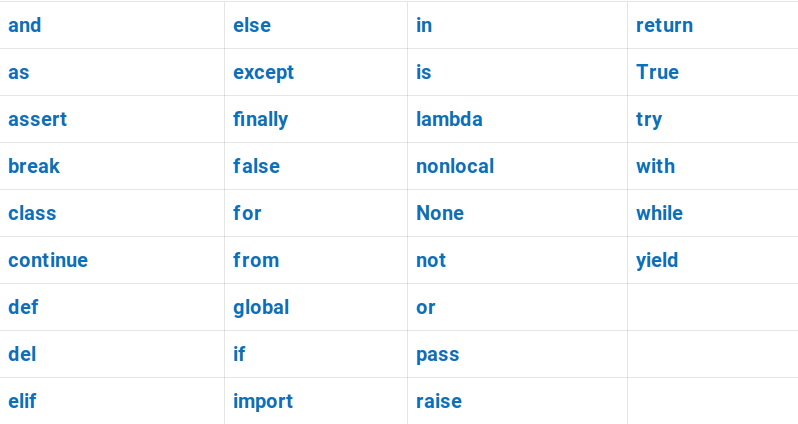Python reserved words, also known as keywords, are predefined and reserved identifiers that have special meanings to the Python interpreter. These keywords form the basic building blocks of Python’s syntax and cannot be used for any other purpose, such as naming variables, functions, or classes. Below is a list of Python reserved words as of Python 3.10:

Explanation of Common Keywords
- False, True, None: These are Boolean values and a special null value, respectively.
- and, or, not: These are logical operators used for combining conditional statements.
- if, elif, else: These are used for conditional branching.
- for, while: These are used to create loops.
- break, continue: These control the flow of loops.
- def: This is used to define a function.
- return: This is used to return a value from a function.
- class: This is used to define a class.
- try, except, finally: These are used for exception handling.
- import, from, as: These are used to include modules and rename them in the local scope.
- global, nonlocal: These are used to declare variables that can be accessed or modified outside of the current scope.
- with: This is used to simplify exception handling and manage resources, often used with file operations.
- yield: This is used inside a function like a return statement but for generator functions.
Usage Restrictions
Because these keywords are reserved, they cannot be used as identifiers (names) for variables, functions, classes, or any other user-defined object. Attempting to use a reserved word as an identifier will result in a syntax error.
Example
Here’s an example demonstrating the use of some keywords in a simple Python program:

In this example:
defis used to define a function namedgreet.ifandelseare used for conditional branching.returnis used to return a value from the function.foris used to create a loop that runs three times.inandrangeare used to iterate over a sequence.
Understanding and correctly using these keywords is essential for writing syntactically correct and functional Python programs.

This was very helpful, thanks!